Let’s Play: Ancient Greek Punishment: Chess Edition Press Kit
Chess! It already feels like a punishment to so many people! But now even more so! What if Zeus threw chess sets instead of lightning bolts?! What if Archimedes was a vengeful god?! What if you just kept getting chessed for eternity?!
Play Let’s Play: Ancient Greek Punishment: Chess Edition
The basics
- Developer: Pippin Barr
- Release: 23 April 2019
- Platform: Browser (desktop and mobile)
- Code repository: https://github.com/pippinbarr/lets-play-ancient-greek-punishment-chess-edition
- Price: $0.00
Who is this Pippin Barr guy?
Pippin is an experimental game developer who has made games about everything from Eurovision to performance art to dystopian post-work futures. He’s an Assistant Professor in the Department of Design and Computation Arts at Concordia University in Montréal. He is also the director of the Technoculture, Art, and Games (TAG) Research Centre, which is part of the Milieux Institute for Arts, Culture, and Technology.
Description
Let’s Play: Ancient Greek Punishment: Chess Edition is the eighth edition in the Let’s Play: Ancient Greek Punishment series begun in 2011 and comprising: Let’s Play: Ancient Greek Punishment (2011), Art Edition Edition (2015), Limited Edition (2016), CPU Edition (2017), Inversion Edition (2019), UI Edition (2019), and Teaches Typing (2019). In Chess Edition the punishments are remediated as variations on classical chess.
History
Chess Edition is part of my ongoing idea of essentially spending 2019 making variations on the base Ancient Greek Punishment set of minigames as a way to remain “productive” while in transition to a life with a newborn son (and later not-so-newborn son).
Let’s Play: Ancient Greek Punishment: Chess Edition is also another data-point in the ultra-detailed process documentation approach called MDMA. So, if you want to, you can read a lot about the game’s development by reading its process documentation, by going through its commit history, and by reading the research questions.
Technology
Let’s Play: Ancient Greek Punishment: Chess Edition was created in JavaScript chiefly using chess.js and chessboard.js. I used jQuery and jQuery UI for some manipulation of elements on the page, and MathJax to typeset the mathematical expressions in Zeno.
License
Let’s Play: Ancient Greek Punishment: Chess Edition is an open source game licensed under a Creative Commons Attribution-NonCommercial 3.0 Unported License. You can obtain the source code from its code repository on GitHub.
Features
- Checkmate!
- Castling!
- En passant!
- Sicilian Dragon!
- Hopelessness!
- Why do my pieces keep falling off the board?!
Trailer
See animated GIFs below, really.
Images
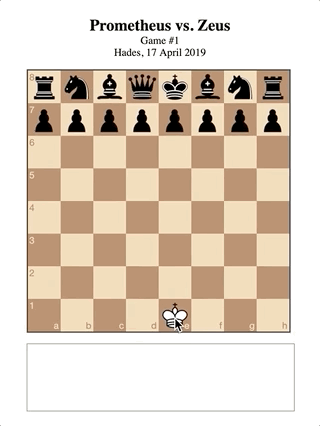
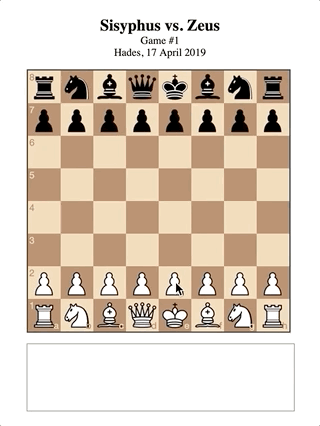
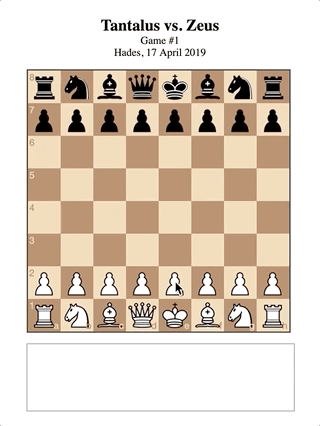
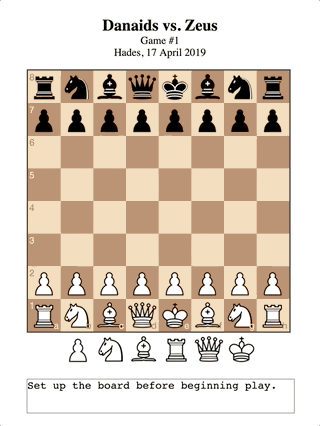
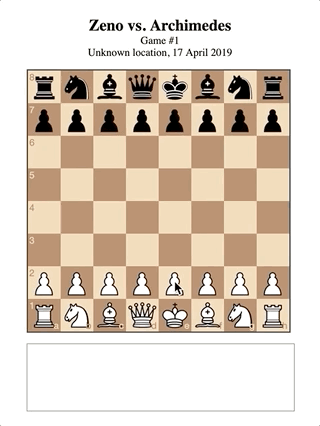
Additional Links
- Process documentation of _Let’s Play: Ancient Greek Punishment: Chess Edition
- Commit history of _Let’s Play: Ancient Greek Punishment: Chess Edition
- Let’s Play: Ancient Greek Punishment (2011)
- Let’s Play: Ancient Greek Punishment: Art Edition Edition (2015)
- Let’s Play: Ancient Greek Punishment: Limited Edition (2016)
- Let’s Play: Ancient Greek Punishment: CPU Edition (2017)
- Let’s Play: Ancient Greek Punishment: Inversion Edition (2019)
- Let’s Play: Ancient Greek Punishment: UI Edition (2019)
- Let’s Play: Ancient Greek Punishment: Teaches Typing (2019)
Credits
- Pippin Barr: basically everything?
- Rilla Khaled: design and sound consultant
- Jim and Mary Barr (aka my parents), Jonathan Lessard: testing! Thanks!
Contact
- Email: pippin.barr+press@gmail.com
- Website: www.pippinbarr.com
- Twitter: @pippinbarr
- Instagram: @pippinbarr
- Facebook: Pippin Barr